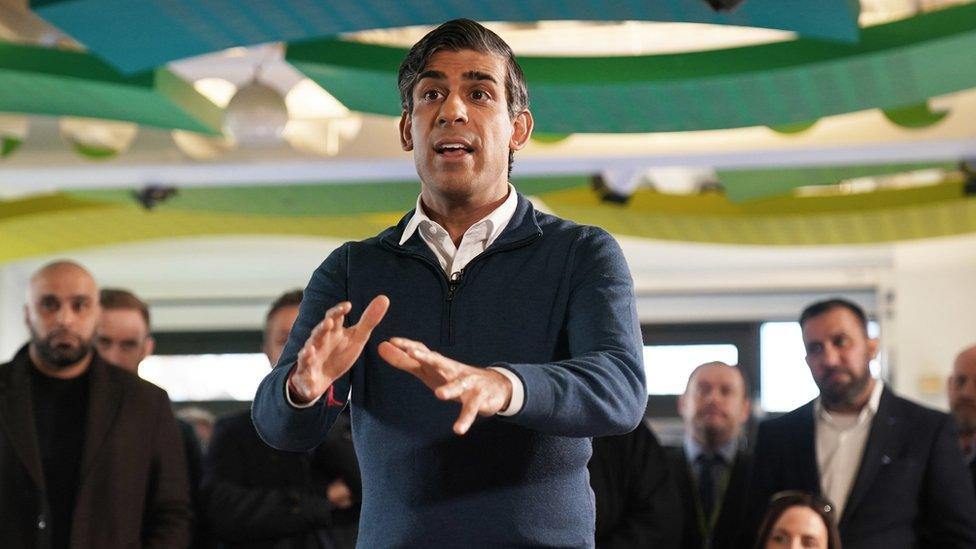Laura Kuenssberg: Why is Humza Yousaf predicting 'inevitable' Keir Starmer victory?
- Published
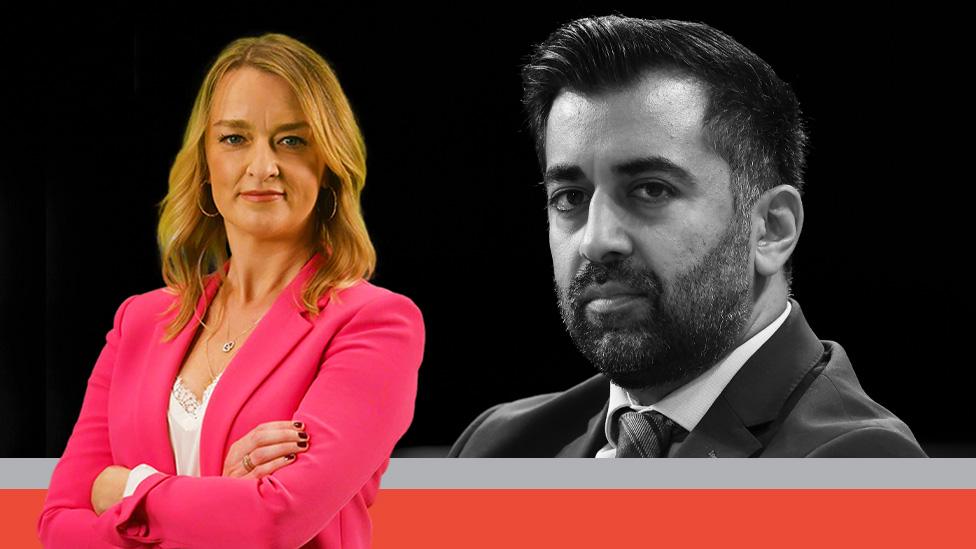
Something strange is happening in part of the UK.
Normally, when we ask politicians who they think will win an election they are performatively shy. "Ooh, I couldn't possibly say," or, "You should know far better than to ask before a single vote has been cast, Laura!"
But there is one prominent politician who claims to know the outcome of the upcoming general election. They say it's "inevitable" that Sir Keir Starmer will be the next PM - and they're not even in the Labour Party.
You voters are a volatile bunch and polling suggests swathes of the public are yet to make up their minds. So what is exactly is the First Minister of Scotland, Humza Yousaf, up to when he proclaims so confidently that Starmer will reach Downing Street - and that the Labour leader "doesn't need Scotland" in order to do it?
The great polling guru Sir John Curtice tells me that, as thing stands, Yousaf is technically right. Based on current numbers, Labour does not have to win dozens of seats in Scotland to get back into power. "Frankly the Labour Party at the moment is going to go walkies without needing to do particularly well" with Scottish voters, he says.
Yet at the risk of sounding like a broken record: the election is miles away. Polls are polls, not elections. Nearly all MPs privately believe the polls will narrow when we get to the campaign proper (although this too is not inevitable). Labour needs an epic swing to get a majority even of one, and Scotland's 57 seats might be utterly crucial.
In 2019 the SNP's dominance in Scotland was absolute - the biggest party by miles for the third general election in a row. The SNP took 48 seats while Labour managed only one. Now there is a real fight between them for first place with the possibility, as things stand, they end up with roughly the same number. You read those numbers right: the SNP could lose about half their seats.
What the first minister is really trying to say to voters, according to a senior SNP MP, is: "Don't worry about getting rid of the Tories - that's going to happen anyway."
Yousaf's challenge is to make the SNP relevant in a UK-wide argument about generational change - and to draw voters into thinking about what Sir Keir Starmer, as prime minister, would actually do for Scotland on big issues such as public spending and an independence referendum.
But another SNP MP says there is "anger and dismay" at the argument Yousaf is making to voters, which they describe as "all over the place". You can see and listen to Yousaf try to explain it on the show.
You can also expect the party in the coming days and weeks to try to lure Labour into a fight on their terms, the senior MP says: "I want to see him come north and onto our territory."
Fights about the pitch to the public don't mask the enormous changes that have taken place before our eyes to one of the biggest political forces. The SNP approaches the general election as a completely different outfit to last time around, and that makes the job of convincing voters to stick with them difficult, whatever the message.
Their decline in the polls is partly because voters didn't like seeing the party's divisions and disagreements during its leadership campaign after Nicola Sturgeon quit.
But the position had already changed before those messy few months, because Tory disasters under Boris Johnson and then Liz Truss prompted some softer Scottish unionists to shift to Labour. The Conservative crash under Liz Truss made it look much more likely that Labour could win a majority - and by implication the SNP lost its potential leverage in the event of a hung parliament.

On this week's show is SNP leader Humza Yousaf
Defence Secretary Grant Shapps and Labour's shadow home secretary Yvette Cooper will also join the show
Watch live on BBC One and iPlayer from 09:00 GMT on Sunday
Follow latest updates in text and video on the BBC News website from 08:00

Humza Yousaf, still a relatively new leader, seems to have been unable to catch a break as he grapples with a series of embarrassments that just seem to keep coming.
The police investigation into the party's finances, the arrest of Nicola Sturgeon herself and subsequent release without charge, and a minister in trouble over roaming charges on his work iPad. In the last 24 hours we've seen revelations about government WhatsApps being deleted during the pandemic.
The polls suggest - and his colleagues acknowledge privately - that Yousaf is yet to convince the public he is an effective leader with a compelling argument to make. And without a realistic prospect of another referendum on independence any time soon, the constitutional argument that used to enthuse some voters doesn't galvanise support as it did before.
That said, voters in Scotland are as volatile as in the rest of the UK, and things could change quickly.
One of his backers argues that Yousaf has played "probably the most difficult hand imaginable" about as well as anyone could have. There is no question that he inherited a mess not all of his own making.
But there is little sign of him being able to improve the situation, with a widespread tacit acknowledgement that the party will fall back. One MP even fears the SNP would be better off in opposition at Holyrood to sort itself out, with the chance of independence "put back by a decade by Sturgeon's antics", they fear.
Arguments about the constitution and whether or not to have another independence referendum used to protect the SNP somewhat from judgement on its record. With that fading, voters seem willing to judge the party's achievements - or lack of - more harshly than they did before.
Humza Yousaf wants to make the argument that it is "inevitable" that Keir Starmer will be PM - instead there is widespread belief that it's inevitable the SNP will fall back significantly at the next election, possibly losing its position as the third biggest party at Westminster if the Lib Dems score well. That would be a huge redrawing of the political map.
Yousaf might not like the comparison but as the election draws closer, it's inevitable too that parallels will be drawn between the SNP and the Conservatives. Both have a young, new-ish leader, who inherited a mess, in charge of a party that had been dominant for more than a decade.
With infighting and a patchy record, the hopes of a turnaround fade as the months pass, and the poll that matters at the ballot box approaches. That could describe our PM Rishi Sunak - but right now it could describe Humza Yousaf too.

What questions would you like to ask Humza Yousaf this Sunday?
In some cases your question will be published, displaying your name, age and location as you provide it, unless you state otherwise. Your contact details will never be published. Please ensure you have read our terms & conditions and privacy policy.
Use this form to ask your question:
If you are reading this page and can't see the form you will need to visit the mobile version of the BBC website to submit your question or send them via email to YourQuestions@bbc.co.uk, external. Please include your name, age and location with any question you send in.
- Published31 December 2023
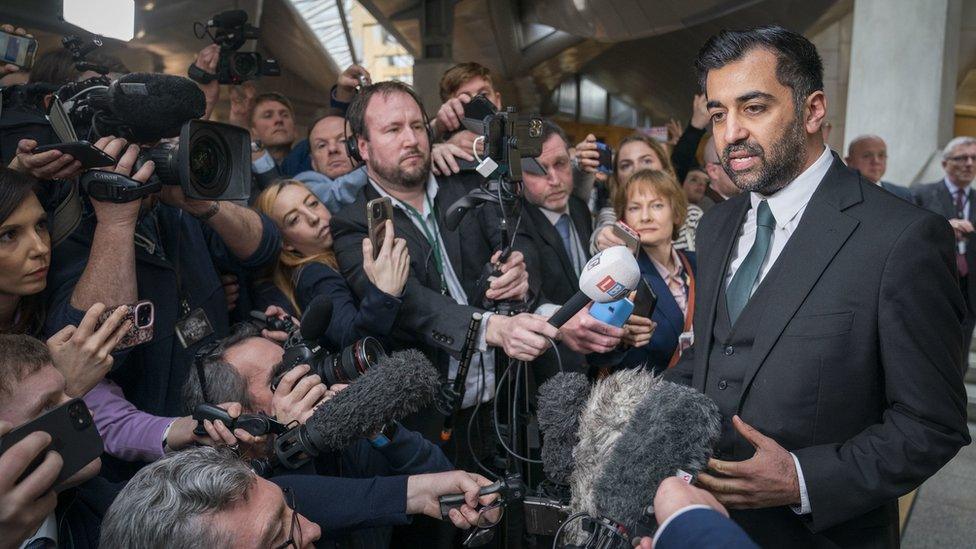
- Published16 January 2024
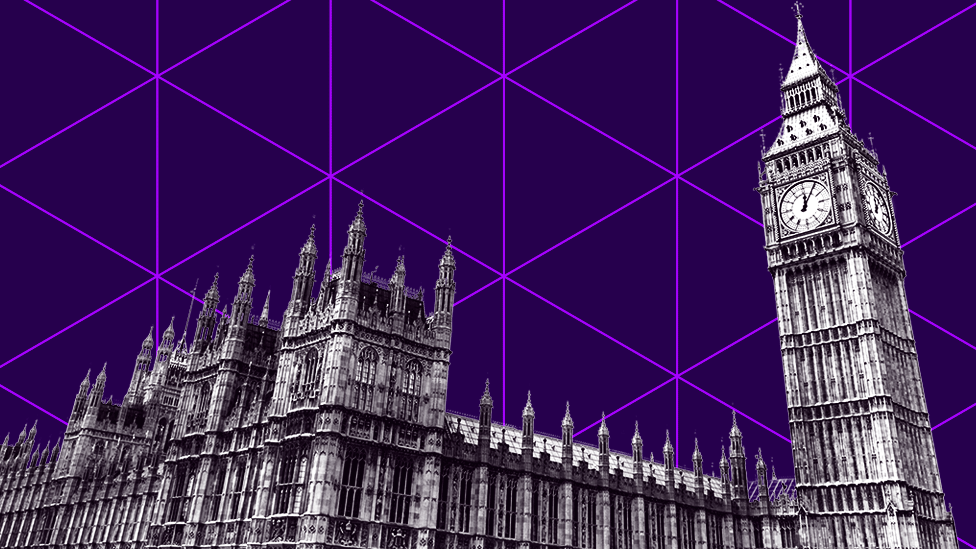
- Published1 January 2024
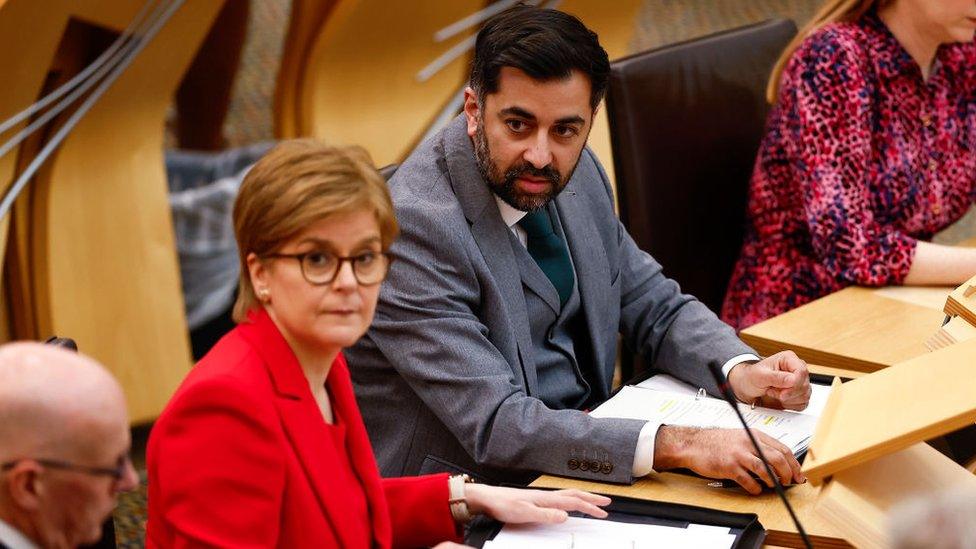
- Published12 January 2024
- Published4 January 2024
